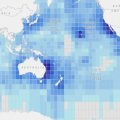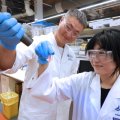Queensland researchers are turning iPhones into personal skin scanners so patients can detect suspicious spots.
The University of Queensland’s Dermatology Research Centre, Queensland University of Technology (QUT) and State Government’s Queensland Institute for Medical Research are trialing an iPhone accessory and app that people can use when they scan their skin for suspicious moles.
UQ Professor Peter Soyer said iPhone accessory Handyscope was an easily attachable optical device and would be more effective than the naked eye for melanoma detection.
“Routine self-examination can save lives but its effectiveness is relatively low,” Professor Soyer said.
“With the Handyscope patients can scan their skin, take photos of suspect skin lesions, record them in an application, and then send the data onto health professionals for examination.
“This development might change the way health care is delivered in the future and ultimately improve skin cancer treatment outcomes.”
HandyScope attaches to the iPhone camera, has a 20x magnification capacity and a polarised light that goes deeper into the skin to show lesions clearer.
Professor Soyer said high-risk melanoma and recovering skin cancer sufferers who visit a specialist every few months or live in rural and remote areas could benefit the most from this innovation.
“Patients could monitor their lesions wherever they are, reducing the required face-to-face examination time with their health professional.
“Melanoma diagnosis by One Click is becoming a reality.”
Trial details: The team is recruiting via the QSkin study, but also looking for other people aged between 50 and 64 years to join the free trial. Participants are asked to complete a short survey. Some of the candidates would then be asked to try out the HandyScope at home.
To join the trial, phone 3138 3018 or email M.Janda@qut.edu.au
Associate Professor Monika Janda from Queensland University of Technology (QUT) and Professor David Whiteman from state government’s Queensland Institute for Medical Research are collaborating on the project.
Media: Brian Mallon, Communication Officer School of Medicine, 0403621109, 07 3365 5254 b.mallon@uq.edu.au
.jpg)









